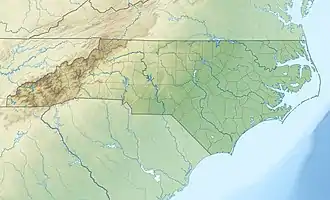Lick Branch (Lanes Creek tributary)
Lick Branch is a 4.72 mi (7.60 km) long 2nd order tributary to Lanes Creek in Union County, North Carolina.
| Lick Branch Tributary to Lanes Creek | |
|---|---|
 Location of Lick Branch mouth  Lick Branch (Lanes Creek tributary) (the United States) | |
| Location | |
| Country | United States |
| State | North Carolina |
| County | Union |
| City | Marshville |
| Physical characteristics | |
| Source | Salem Creek divide |
| • location | pond on the southwest side of Marshville, North Carolina |
| • coordinates | 34°58′56″N 080°22′38″W[1] |
| • elevation | 558 ft (170 m)[2] |
| Mouth | Lanes Creek |
• location | about 2 miles northeast of Marshville, North Carolina |
• coordinates | 34°58′17″N 080°18′33″W[1] |
• elevation | 389 ft (119 m)[2] |
| Length | 4.72 mi (7.60 km)[3] |
| Basin size | 3.97 square miles (10.3 km2)[4] |
| Discharge | |
| • location | Lanes Creek |
| • average | 4.81 cu ft/s (0.136 m3/s) at mouth with Lanes Creek[4] |
| Basin features | |
| Progression | Lanes Creek → Rocky River → Pee Dee River → Winyah Bay → Atlantic Ocean |
| River system | Pee Dee River |
| Tributaries | |
| • left | unnamed tributaries |
| • right | unnamed tributaries |
| Bridges | W Main Street, Morgan Place (x2), S Elm Street, S White Street, Hasty Road |
Course
Lick Branch rises in a pond on the southwest side of Marshville, North Carolina in Union County. Lick Branch then flows east to meet Lanes Creek about 2 miles southeast of Marshville.[2]
Watershed
Lick Branch drains 3.97 square miles (10.3 km2) of area, receives about 48.2 in/year of precipitation, has a topographic wetness index of 442.68 and is about 31% forested.[4]
References
- "GNIS Detail - Lick Branch". geonames.usgs.gov. US Geological Survey. Retrieved 24 October 2020.
- "Wide Mouth Branch Topo Map in Union". TopoZone. Locality, LLC. Retrieved 24 October 2020.
- "ArcGIS Web Application". epa.maps.arcgis.com. US EPA. Retrieved 24 October 2020.
- "Lick Branch Watershed Report". US EPA Geoviewer. US EPA. Retrieved 24 October 2020.
This article is issued from Wikipedia. The text is licensed under Creative Commons - Attribution - Sharealike. Additional terms may apply for the media files.